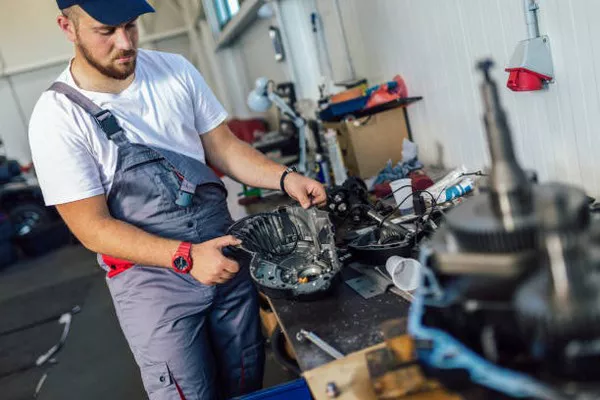Machine shops frequently require open die forged parts for a range of applications, including the production of large, custom components or small batch runs that demand high strength and durability. In these situations, many machine shops turn to forgers for “as forged” parts, which are then subjected to finish machining and other secondary processes to achieve the exact tolerances, dimensions, and surface finishes specified by clients.
However, opting for near net shape forgings can be a more advantageous choice, enabling machine shops to lower costs and enhance profit margins.
What are Near Net Shape Forgings?
Near net shape forgings are seamless rolled rings or open die forgings designed to closely resemble the final shape of the finished machined part. In contrast, “as forged” components often come with a rough surface finish (500 RMS or greater) and may have irregular surfaces and metal scales that require significant machining to remove. This additional machining not only increases cutting time but also contributes to tool wear and higher cutting fluid consumption, negatively impacting profitability. For customers with tight budgets, the extra stock material that becomes waste can be a critical factor in securing a job.
Fortunately, near net shape forgings can achieve tolerances within 3mm on all dimensions and feature a much finer surface finish. Although the initial purchase price might be higher, the resulting reductions in machining time, tool wear, waste, and expedited delivery can lead to overall cost savings and increased profits. Furthermore, less machining time increases machine availability for other projects.
Diverse Applications of Near Net Shape Forgings
Near net shape forgings encompass more than just outer diameters (ODs), inner diameters (IDs), and lengths. They can include steps on round shafts, blocks, squares, rectangles, hubs, wheels, cylinders, blind cylinders, flanges, drive ends, tending ends, and complex shapes. All Metals & Forge Group, an ISO 9001:2015 and AS9100D-certified manufacturer, specializes in open die forgings, seamless and contoured rolled rings, and complex forged parts that adhere to stock allowances or near net shape tolerances.
Benefits of Open Die Forgings
Open die forgings and seamless rolled rings are crucial components in various industries, including aerospace, automotive, defense, energy, food processing, mining, oil and gas, power generation, pulp and paper, and shipbuilding. Given their critical role, open die forgings provide superior structural integrity compared to other metalworking processes, as they eliminate structural voids and enhance the directional grain flow and grain size of the material.
For instance, seamless rolled rings produced by All Metals & Forge Group are known for their resistance to wear, fatigue, and stress, resulting in improved performance. Depending on the selected metal or alloy, these forgings can also resist thermal and chemical damage, thereby extending their lifespan and reducing maintenance, repair, and replacement costs.
Scalability and Cost-Effectiveness
Open die forging is particularly beneficial for crafting large, custom components. All Metals & Forge Group is capable of manufacturing seamless or contoured rolled rings with diameters up to 200 inches and custom forgings as long as 40 feet or weighing up to 80,000 pounds. Additionally, smaller components, roughly one cubic foot in size, can be produced as near net shape forgings.
While near net shape forgings may initially appear more costly, a comprehensive analysis of all machining-related expenses often reveals significant savings. When machining parts from basic profiles such as blocks, rounds, or rectangles, substantial material is wasted, yet companies still pay for the excess. In contrast, open die forgings are shaped by dies, minimizing material waste.
Near net shape forgings can achieve tolerances within 3mm and feature smoother surface finishes, resulting in less material removal and quicker delivery times.
Cost Savings and Efficiency Gains
When manufacturing multiple parts, the cumulative savings from near net shape forgings can be substantial. There are also hidden savings related to the time spent reordering cutting bits, restocking cutting fluids, recycling metal waste, and optimizing machine availability.
More significant savings are attainable with the acquisition of a near net shape forging that has a refined surface finish, especially when the final profile is more complex. For example, consider a 10-inch round bar measuring 120 inches long, with an allowance for finishing to final dimensions. One supplier might offer a forging with a quarter-inch allowance (10.25 OD x 120.25 inches), weighing approximately 2,814 pounds in most steels. However, a supplier that can provide the part with only a 3mm allowance would reduce the bar’s weight to 2,739 pounds—a difference of 75 pounds. This excess weight not only increases the purchase price but also generates additional waste and machining time, costs ultimately passed on to the customer.
Quality Assurance and Standards
Open die forgings can be crafted from a variety of materials, including carbon steel, alloy steel, stainless steel, tool steel, nickel, titanium, and aluminum. These forgings comply with stringent industry standards such as ASTM, AMS, AISI, ASME, SAE, DIN, ASME B 16.5, ASME B16.47, and API 6A. Additionally, All Metals & Forge Group routinely conducts ultrasonic testing at no extra charge to ensure that parts are free from internal cracks, pits, or voids.
The boundaries of near net shape forgings are defined by the supplier. When more precise tolerances and finer surface finishes are necessary, a company like All Metals & Forge can deliver parts to within +/-0.001 inch of drawing dimensions and achieve surface finishes of 64 or 32 RMS.
Conclusion: Strategic Advantages of Near Net Shape Forgings
Near net shape open die forgings and seamless rolled rings can offer a strategic competitive edge for machine shops of all sizes, whether operating independently or as part of an OEM facility. By optimizing quotes by even a small percentage on each bid related to these forgings, machine shops can significantly enhance profits and internal cost efficiencies.
You Might Be Interested In

